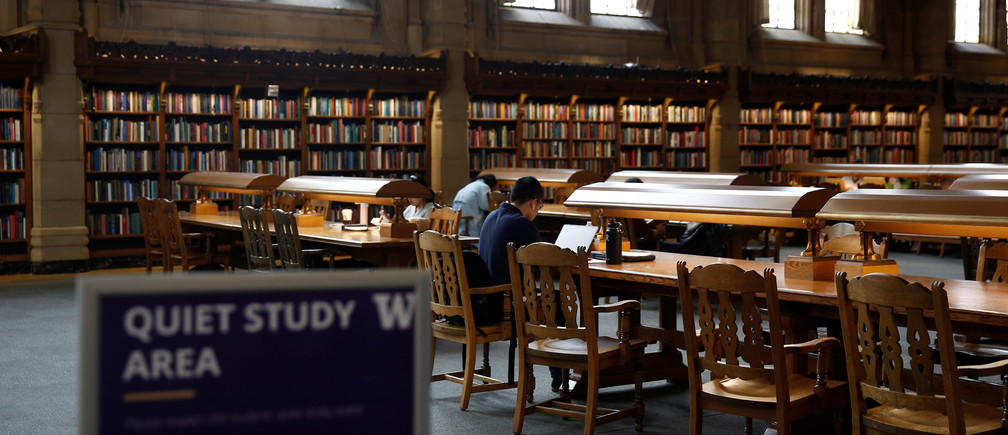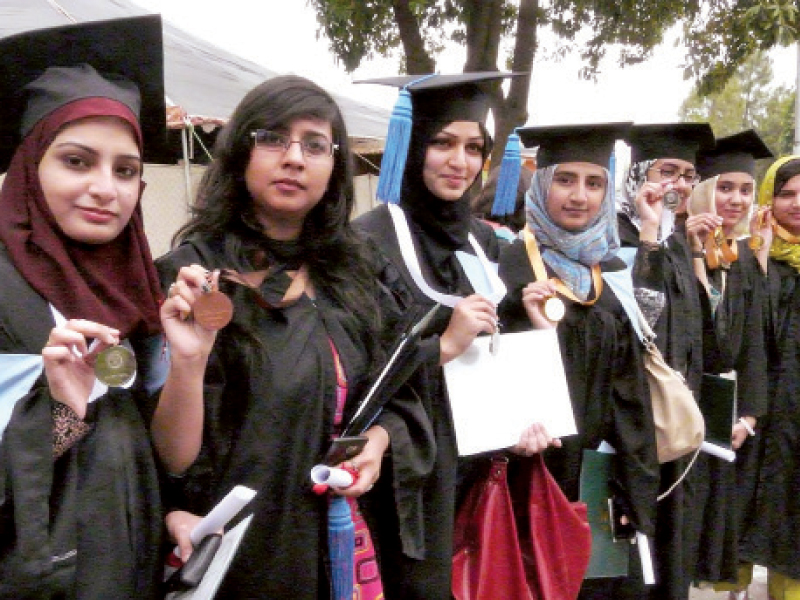Holding her plastic folder in hand and waiting in line for her turn to submit some forms at University of Karachi’s silver jubilee gate section, Kiran Fatima reveals that she was in shock when she learned that the Higher Education Commission (HEC) had closed down two-year degree programmes. Fatima who has already appeared in part one of her BA degree now considers her future to be in shambles as her plans to do an MA after completing her BA and then help financially support her widowed mother seem all but derailed for now.
Iqra Khan’s story is not very different either. Khan, who has plans to apply for teaching later on, has two papers left in Islamic studies before her MA is completed. “What is the use of appearing now and getting a degree if it is not recognised [afterwards]?” she said. “What if I want to apply for a government job after getting my degree? They will never accept it [the job application] if the federal organisation does not consider my degree valid.”
There are several students who have similar stories to that of Fatima and Khan. Hundreds and thousands are just a few exams shy of finishing their degrees or have registered and were on the cusp of taking their examinations.
A Reuters file image of students studying at a university library
To equalise the standards of education in Pakistan with that of the rest of the world, HEC has been trying time and again to implement new rules and make changes in the existing system of degree years and credit hours. Recently, a tug of war between the Government of Sindh and Federal HEC began when the regulatory body announced to put an end to the two-year degree programmes. However, the universities and boards authorities in Sindh have decided to continue these programmes, whereas in Punjab, the programme has been ended and a substitute programme has been accepted.
In 2011, the Associate Degree programme (AD) was announced as an alternative to the BA/BSc degree programme, where the former is equivalent to 14 years of schooling, and entitles graduates to get admission in the 5th semester of respective BS programmes after fulfilling respective university’s entry requirements, just like previous students used to get accepted into an MA programme after completing their BA/BSc degrees, explained Ayesha Ikram, who is serving as the Director General in the Human Resource Development at the HEC.
In 2016, the transition period for the concluding programme came to an end and a final decision was made to halt admissions into the BA/BSc programmes on December 31, 2018 followed by a decision to stop admissions into the MA/MSc programmes on December 31, 2020. It was also decided that the last BA/BSc exam would be held in 2020, and that the admission to the last batch of MA/MSc students would take place before December 31, 2020. These decisions were confirmed in 2017 and the universities were simultaneously informed, and reminders about this decision were sent to universities thereafter in 2018, 2019 and again in 2020.
Clarifying HEC’s position, Ikram said that the HEC has not ended the two-year programme, rather stopped admissions into the two-year BA/BSc programme after December 2018. After that deadline, admissions were only to be given into the AD programme, which is also a two-year programme.
The HEC observed that two-year degree programmes were still being offered at universities and colleges affiliated with it despite its 2018 notification. PHOTO: APP/File
Despite HEC’s clear notifications of the change in policies, University of Karachi, in clear defiance of HEC’s announcement, continued to enroll students into the two-year-degree programmes. However, according to Ikram, the fate of these students and institutes will now clearly be impacted by the violation of this rule as BA/BSc degrees issued after 2021 will not be recognised by the HEC.
Students hang in the balance
Students who are in a limbo over this tug of war and have enrolled into the programmes or have completed one year are asked to enroll in a regular AD programme or will enroll in the distance learning mode. However, any degree of BA/BSc will not be entertained or recognised by the HEC.
According to Ikram, the change was made because the four-year BS programme helps universities plan the education process better and it is also consistent with the international practice. “HEC is continuously trying to improve the quality of the graduate programmes,” she said.
But what of the state universities in this current scenario where a large amount of their revenue is generated from these private bachelors and masters degree programme? “Universities are advised to adhere to rules as they [HEC] are fountains for knowledge and are creating future leaders. They should not violate the existing rules,” she said.
Same mistakes, different faces
According to Shakeel Farooqi, representative Federation of All Pakistan Universities Academic Staff Association (FAPUASA), none of the chairpersons appointed by the HEC until today including Dr Ata-ur-Rahman, Tariq Banori, Javed Laghari and Mukhtar Ahmed, have ever served as a proper educationist or teacher in the academia which is why they cannot understand the outcry and also cannot connect to the issue in terms of how students suffer from such decisions.
“Majority of the students cannot afford to come to regular universities, they earn in the morning and appear privately for exams,” he said adding, “HEC is trying to take away the opportunity of middle-class students to complete his BA and start earning, they are now in a state where they do not have the option of studying privately like they used to.”
While graduate level students are eligible for the commissioned exams in the province after these changes, it should be noted that the job opportunities of these students are shrinking, which is counterproductive as the ultimate goal of majority of the students, after completing 14 years of education, is to ultimately get a job. “Pakistan’s higher education is useless because where we need to make education affordable and easier because we are not very strong economically, we are trying our very hard to make it difficult for the students,” he added.
Sharing how HEC has been shifting from one stance to another, and keep changing policies every now and then, he said that the visionary committee including several university professors, presented this same Associate Degree in 1999 as well, after which the student wotould be eligible join university in third year and were also eligible to appear in CSS exams.
HEC created a similar situation to that of the current one, when they announced the BS four-year programme and later on kept recognising other programmes. “Students and their admissions at the University of Karachi faced hundreds of problems on a daily basis after which, the university with HEC’s approval announced conversion and later on closed down giving admissions in BS programme,” he said while sharing how now University of Karachi just offered BA(Hons), BSc (Hons), MA and MSc.
Sindh Government’s grit to ignore HEC
To take this issue of students one step ahead, the adviser to the Chief Minister of Sindh on Educational Boards and Universities, Nisar Ahmed Khuhro announced that Sindh will continue the two-year programmes and is not closing it down despite whatever HEC has to say.
While talking to The Express Tribune, Khuhro said that, “After the 18th amendment, HEC cannot force us to comply with their policy and it is about the future of hundreds of thousands of students who will be destitute after this decision”.
He also said that the Sindh Government will go into court against them and this decision of theirs. “Majority of the students who apply to these programmes are supporting their families financially by working during the day and cannot attend regular universities which is why HEC needs to understand that there are a lot of students who need moral support and at least complete BA/BSc privately or from concerned colleges,” Khuhro explained adding that, “There is a whole system in place from colleges which will lapse as soon we start implementing this decision and the outcome is also not in favor of the students, which is why we will rectify this policy on every level.”
(Details of the AD are available in the Undergraduate Education Policy in 2020 Policy can be downloaded from https://www.hec.gov.pk/english/services/faculty/Plagiarism/Documents/UGE-Policy.pdf)

